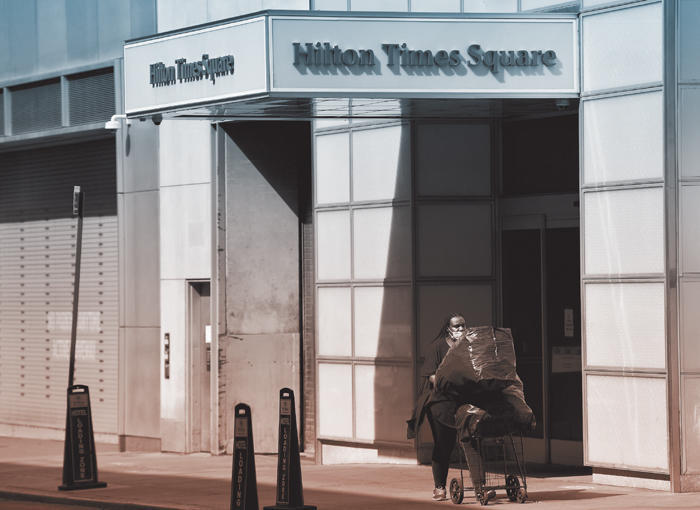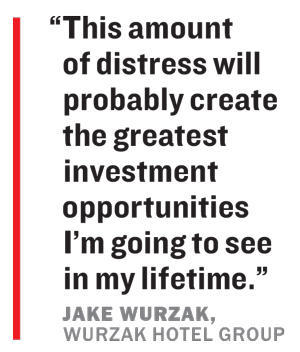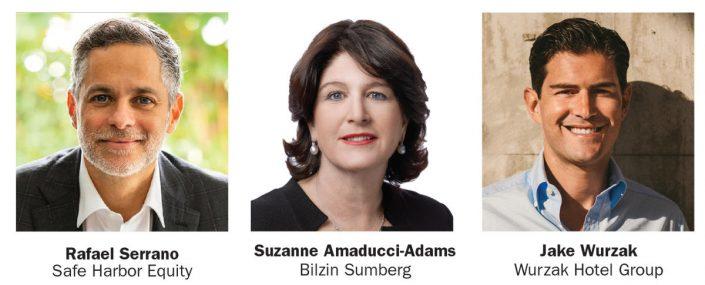 All of the lights in the Hilton Times Square have been pitch black for weeks — one of several ominous signs for hotel owners in New York and other large cities around the country.
All of the lights in the Hilton Times Square have been pitch black for weeks — one of several ominous signs for hotel owners in New York and other large cities around the country.
The owner of the 478-room property, just blocks away from Broadway and Bryant Park, disclosed plans to the state’s Labor Department last month to permanently shut its doors and lay off 200 employees.
The real estate investment trust Sunstone Hotel Investors had been struggling to make payments on a $77 million mortgage even before March, and the 44-story building became one of several name-brand hotels to permanently close this fall. The Hilton Times Square was soon followed by the Courtyard by Marriott in Herald Square and the Roosevelt Hotel on East 45th Street, which shuttered after nearly a century of business.
On the other side of the country, the Luxe Rodeo Drive Hotel in Beverly Hills also closed for good, after having embarked on a full renovation just before Covid hit. Owner Luxe Hotels told the Los Angeles Times it’s now considering “alternative options” for the high-end hotel.
Seven months into a pandemic that has hit the hospitality and retail sectors the hardest, many hotel owners around the U.S. are at a crossroads, despite an uptick in occupancy after most city and state shutdown orders were lifted. Some of the more highly leveraged owners are now deciding between repurposing their properties, selling at deep discounts, throwing the keys back to their lenders or buying themselves more time if they can afford to.
But forbearance agreements are quickly expiring, and temporary layoffs are becoming permanent. Without a federal bailout, an estimated 38,000 U.S. hotels could close permanently, while another 28,000 are at risk of being foreclosed on, according to the American Hotel & Lodging Association.
At the same time, from California to South Florida, hotel owners face growing threats from natural disasters, including fires, storms and flooding. One Napa Valley resort reportedly suffered extensive damage from California’s wildfires last month.
 After a tumultuous 12 months, average hotel occupancy nationwide was at the halfway mark in September, down about 30 percent year over year, according to preliminary monthly data from hotel research firm STR. Average revenue per available room in New York, meanwhile, tumbled about 70 percent year-over-year to $53 a night from $182 in the same period. In California, RevPAR fell by nearly half to $71. In Florida, it dropped by about 30 percent to $46.
After a tumultuous 12 months, average hotel occupancy nationwide was at the halfway mark in September, down about 30 percent year over year, according to preliminary monthly data from hotel research firm STR. Average revenue per available room in New York, meanwhile, tumbled about 70 percent year-over-year to $53 a night from $182 in the same period. In California, RevPAR fell by nearly half to $71. In Florida, it dropped by about 30 percent to $46.
Suzanne Amaducci-Adams, a partner at the Miami-based commercial law firm Bilzin Sumberg, said many hotel owners have become paralyzed by the potential for new shutdown orders as Covid starts to resurge in major markets.
“I think people just don’t know what to do at this point,” said Amaducci-Adams, who runs her firm’s real estate practice. “Borrowers have been using their savings, whatever available cash they have on hand, and now that money has pretty much run out. Hotels are holding their breath.”
Still, distress always creates new opportunities, and there are plenty of buyers in the market, including Starwood Capital Group co-founder Barry Sternlicht and the British billionaire brothers David and Simon Reuben of Reuben Brothers.
Insiders say a number of loan sales and preferred equity deals have already happened. But when it comes to outright property sales, the asking price and the offers are still far apart in many cases, and time is running out for many borrowers.
“Any forbearance the lenders have previously offered is starting to end, and they’re very reluctant to do anything further,” said Jake Wurzak, whose Wurzak Hotel Group owns and operates hotels in several U.S. markets.
As the clock ticks…
In the early months of the pandemic, many borrowers worked out special arrangements with their lenders, in some cases burning through their reserves to fund interest payments.
But a growing number of owners have stopped making payments altogether and are walking away from their hotel properties.
“As owners start to realize how long this is, they’re going to have to reevaluate whether it makes business sense to hang on,” said Amaducci-Adams.
Ashford Hospitality Trust — which reportedly received and returned $38 million in Payment Protection Plan funding in the first few months of the pandemic — sold its newly purchased Embassy Suites near Times Square to Magna Hospitality Group for a 41 percent discount after missing several mortgage payments.
The hotel REIT announced that it signed forbearance agreements for 34 hotels, totaling about $1.2 billion in debt, which will allow Ashford to defer interest on its loans for another six months.
Meanwhile, a $768 million loan backing Colony Capital’s Tharaldson hotel portfolio tops the list of commercial mortgage-backed securities deals that are more than 90 days delinquent, according to data from Trepp. The second-biggest delinquent CMBS deal is a $329 million loan backing Thor Equities’ Palmer House Hilton in Chicago, which went into foreclosure in August.
CMBS loans, which are more difficult to renegotiate than most other loans due to obligations borrowers have with their bondholders, often become the first to go under.
“The original reaction was to kick the can,” said Douglas Hercher, principal and managing director of the New York-based advisory firm RobertDouglas. “Lenders and borrowers are now looking for a solution that will carry them for the next 12 months.”
But this pandemic is unlike previous economic crises.

Demand for international travel may not return until at least 2024, according to one industry study. Domestic travel, especially business travel, is expected to remain low, and now that school is back in session, many families are traveling less by car.
As a result of the plunge in demand, many hotels are extending their temporary layoffs beyond six months and eliminating positions. Walt Disney recently announced that it plans to cut 28,000 jobs, mostly at its California and Florida theme parks.
“Even in the depths of post-9/11, you never had occupancy go to 10 or 20 percent. You never had hotels closing,” Hercher noted.
Lender limits
At the same time, most lenders don’t want to take over a hotel if it means running it in a coronavirus economy.
Attorney Luis Flores, a partner at Miami-based Saul Ewing Arnstein & Lehr, said the majority of banks and other debt providers didn’t issue their loans “to become hotel operators.”
But many hotel owners that can’t climb out of the hole are now asking their lenders to take a discounted payment on their debt while forgoing whatever equity they had left, accelerating transfers of ownership, he said.
“The aggressive owners and developers are being smart and saying … ‘We want to exit the asset as soon as possible,’” Flores noted.
He and others in the business say bank financing for new hotel acquisitions has become virtually nonexistent, limiting the pool of buyers to private equity firms, special purpose funds and family offices that will pay cash.
A growing number of banks and other lenders are also looking to liquidate their loans.
Frank Nardozza, chair and CEO of REH Capital Partners, an investment advisory firm based in Fort Lauderdale, said some nonbank lenders are considering selling their loans for deep discounts — ranging from 20 percent to 60 percent.
Not all hotels are on the chopping block, though.
Properties that rely on large conventions and meetings and that require air travel to get there will likely take the longest to recover. On the flip side, drive-to destinations, including many beachfront markets throughout Florida and in other locations with access to beaches, mountains or parks, experienced a rise in occupancy over the summer.

“People don’t want to get on planes. The lead time for booking those 2,000- [to] 10,000-person conventions is six months or more,” Hercher said, referring to markets such as Las Vegas, Orlando and New York City.
“The operating costs for those hotels is really high,” he added.
Who’s buying?
Despite the growing number of challenges facing hotel owners, some investors are still ready to pounce on new hotel deals.
CBRE hotel broker Paul Weimer said he’s being “overloaded” with calls from potential buyers, many of whom have ideas for repurposing existing hotels into multifamily or other uses. “Everybody and their brother wants to buy a discounted hotel,” he maintained.
Sternlicht, for one, has been vocal about his hunt for discounted hotels. As of late July, a Starwood fund was looking to raise billions to snap up distressed properties, including hotels that have shuttered due to the pandemic.
Reuben Brothers last month acquired a 25 percent stake in Jeffrey Soffer’s JW Marriott Miami Turnberry Resort & Spa in South Florida’s wealthy Aventura enclave, and plans to partner with Soffer on other assets. Since April, Soffer’s Fontainebleau Development has been seeking modifications to a $975 million CMBS loan backing its 1,500-room Fontainebleau Miami Beach — Miami-Dade County’s largest hotel, which relies heavily on group bookings.
CGI Merchant Group, meanwhile, launched a $500 million fund to invest in struggling hotels in North America and the Caribbean, properties that would be branded under the Hilton flag. Miami-based Safe Harbor Equity, led by Rafael Serrano, is raising $500 million as well to invest in hotels in major metropolitan areas, including New York, Los Angeles, Chicago and Miami.
Serrano said his fund will spend between $25 million and $50 million to acquire the debt on distressed hotel deals. “We would like to work with the borrowers to position ourselves as rescue capital,” he noted.
Even some operators that already own struggling hotels are in the market for discounted assets. Wurzak, whose Philadelphia-based firm has majority stakes in 12 properties around the country, said he has his eyes on full-service hotels in markets with high barriers to entry, such as New York and Miami.
“This amount of distress will probably create the greatest investment opportunities I’m going to see in my lifetime,” he said.
Wurzak said he’s looking to inject $200 million into more than $1 billion worth of hotel properties over the next three years. Though his hotels are “certainly in some level of distress,” Wurzak said his firm can raise capital as needed and is well-positioned to make it to the other side of the pandemic.
“We’re not a hedge fund sitting in front of a monitor in New York,” he noted. “We operate hotels.”
Though a number of U.S. hotels are now up for sale, many buyers and sellers haven’t been able to agree on a price, according to industry brokers.
Susan Gale, a hotel broker with One Sotheby’s International Realty in Miami Beach, said some of her clients are “under pressure” and willing to discount up to 20 percent.
Gale said the situation will be even more dire come November, as the hotels that have been waiting to reopen burn through more cash to cover expenses that include brand fees, maintenance and accounting.
REH Capital’s Nardozza said a high-end hotel could be incurring $1 million in annual operating costs even if it’s shut down.
Repurposing rooms
Some owners are considering alternative uses for their properties, including converting their hotel rooms to office space, student housing and homeless shelters, the latter of which can collect rent from city governments and nonprofits.
The 600-plus-room InterContinental Times Square in New York, which housed doctors and nurses this spring, is now offering rooms as office space on a suite-by-suite basis.
Developer Jimmy Tate, who purchased distressed debt in the last recession, said owners have to do what they can to fill rooms. In addition to running marketing campaigns for staycations at his Bahia Mar Fort Lauderdale Beach, Tate is setting up some of the resort’s rooms as offices.
“It’s different, but it’s getting people to come to the hotel,” he said, noting that his plans to redevelop the waterfront Fort Lauderdale property are temporarily on hold.
While predictions for a full recovery range from 2022 to 2025, no one really knows when the country’s biggest hotel markets will return to pre-pandemic levels.
For now, many of the hotels that remain open have slashed their rates, resulting in a pricing war that could slow down the industry’s recovery in the long run. The average daily rate in the U.S. was under $100 a night in September, a 26 percent drop year-over-year, according to STR, with one of the steepest declines occurring in New York City at nearly 50 percent.
Some industry players warned that the markets that had been struggling before the pandemic, whether there was an oversupply or the properties were overleveraged, will experience the greatest challenges.
“There are certain urban markets that are just going to recover more slowly,” said Hercher of RobertDouglas, citing the Big Apple as a prime example.
“New York is going to be challenged for a while,” as the pandemic has imposed a “day of reckoning” for many hotel owners in the city, he argued.
“So many things people think of as quintessentially New York — great restaurants, Broadway, music venues — until you get that tourism engine really fired again, that’s just a big demand generator that’s not there,” Hercher noted.
